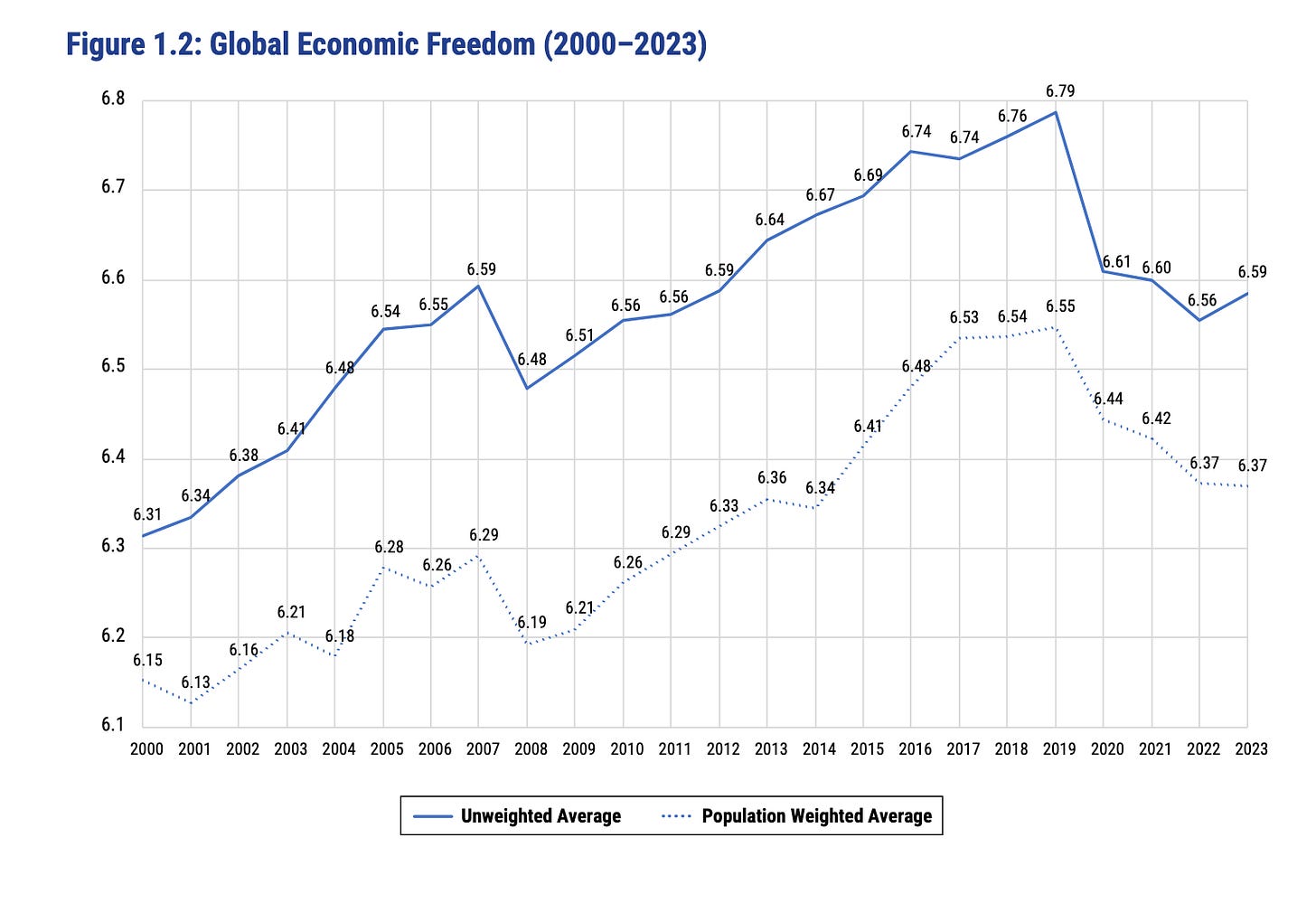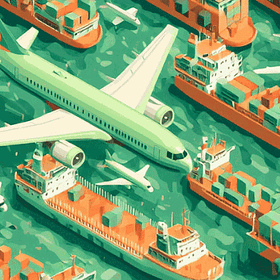Doomslayer: Progress Roundup
Innovations in precision agriculture, hordes of humpbacks, an update on economic freedom, and more.
Economics & Development
The latest Economic Freedom of the World report from the Fraser Institute finds that the disastrous erosion of global economic freedom that followed the pandemic may have come to an end in 2023. That year, the unweighted index score—simply the average across all countries in the index—rose from its 2022 low, while the population-weighted value stopped falling. While calling this a “recovery” would be an overstatement, the new data suggest the world may be regaining at least some of the freedom it lost since 2019.
Despite escalating US tariffs, global trade volume was 5 percent larger in the first seven months of 2025 than during the same period in 2024, though World Bank economists caution that companies may have “rushed to complete transactions before tariff increases took effect.”
The Rising Tide: How Trade Lifts All Boats
The globalization of the market system has brought global extreme poverty to its lowest levels in human history.
Energy & Environment
Conservation and biodiversity
Recent research suggests there were over 50,000 eastern Australian humpback whales in 2024, up from 25,000 a decade ago.
Some cave-dwelling bat populations in Wisconsin appear to be recovering from White Nose Syndrome, the infamous fungal disease that has wiped out millions of North American bats.
Seabirds, crabs, geckos, and native flora are flourishing on Bikar Atoll and Jemo Islet—two small islands in the Marshalls—after conservationists successfully eradicated invasive rats.
Salmon are breeding in England’s River Don for the first time in over 200 years.
The Little Bustard, a heavy-bodied grassland bird native to Eurasia, is making a comeback in Kyrgyzstan after it was nearly extirpated during the Soviet period.
Energy & Natural Resources
New Hampshire has passed a law exempting electricity providers who don’t connect to the grid from public-utility regulation, cutting red tape that can delay projects by years and opening the door to experimentation and innovation in the electricity sector.
Nigeria is importing record quantities of solar panels, which are helping its citizens cope with the country’s notoriously unreliable power grid.
Food & Hunger:
A biotechnology company called InnerPlant has developed soybeans that glow when stressed, allowing farmers to intervene early and avoid crop losses. Recently, their system, which pairs the fluorescent soybeans with optical sensors, detected a fungal infection weeks before it would have been visible to the naked eye.
The New York Times recently profiled another precision agriculture innovation: health-tracking collars for cows. The devices monitor each animal’s activity and rumination—a measure of digestion—and automatically flag abnormalities, helping farmers keep their herds healthy. They might also make animal husbandry less labor-intensive:
Annie Vannurden, general manager of Warner Dairy in Brown County, S.D., bought the collars last year and has used them to expand her dairy to 5,000 cows from 2,700 without adding a single worker.
Health & Demographics
Twenty-two countries and territories in the Western Pacific, including Japan and a number of small island nations, have eliminated measles and rubella.
A new vaccine is being rolled out across Africa’s “meningitis belt,” where dry winds and dust fuel regular and deadly outbreaks. The shot protects against nearly all major bacterial strains that cause meningitis in sub-Saharan Africa and could save millions of lives.
Chinese surgeons have transplanted a genetically modified pig liver into a living person for the first time. While the organ functioned for just 38 days before it had to be removed, doctors hope procedures like this one could buy patients crucial time for their own livers to recover or regenerate.
Science & Technology
With new federal rules expected to permit “beyond visual line of sight” flights, a growing list of US companies, including Walmart, Uber, DoorDash, and Amazon, are launching or significantly expanding their drone delivery programs.
Flock Safety, a tech startup focused on crime detection and prevention, is selling drones to private businesses to help them catch thieves.
Verizon is partnering with AST SpaceMobile to launch satellite-based cell service across the US starting next year.
Google’s DeepMind laboratory has created an AI system called RoboBallet that allows factory robots to coordinate their movements and avoid crashing into each other. Normally, this kind of choreography has to be painstakingly programmed by humans.




Thanks for the shout to New Hampshire!!!! : )